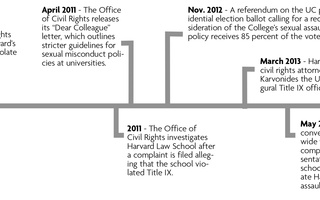New U.S. Department of Education guidelines released in tandem with a White House report on campus sexual violence could put pressure on Harvard to evaluate its sexual assault policies and procedures, even as the Office for Civil Rights is reviewing the University’s proposed revisal of those same regulations.
The documents outline recommendations and Title IX policy guidelines for properly addressing sexual violence at colleges at universities across the country. Formally released on Tuesday, they come two weeks after University President Drew G. Faust announced that Harvard had submitted a revised sexual assault policy to the OCR for review.
For Harvard in particular, the OCR guidelines and the White House report’s recommendations could be in tension with current evidence standards for sexual misconduct cases, choice of Title IX coordinators, and the extent to which administrators have involved students in the reevaluation of University policies.
Peter F. Lake '81, a professor at Stetson University College of Law who specializes in higher education law, said that there is a “tremendous amount to digest” in the reports.
“I think it really emphasizes that the intensity of federal intervention in sexual misconduct issues on campuses [has] ramped up to as high a level as it’s ever been in American higher education history,” Lake said. “This sets a new bar for how much the federal government is willing to throw into this issue.”
CLARIFYING THE GUIDELINES
In a 53-page document, OCR provided renewed guidance on handling Title IX grievances, emphasizing that “any procedures used for sexual violence complaints, including disciplinary procedures, must meet the Title IX requirement of affording a complainant a prompt and equitable resolution...including applying the preponderance of the evidence standard of review.”
Although the “significant guidance document” does not hold the force of law or add additional Title IX requirements, it provides information on how OCR will evaluate whether or not a college is compliant with Title IX regulations. The office is currently investigating the handling of sexual assault cases at both the College and Harvard Law School.
The preponderance of the evidence standard—which requires more than 50 percent certainty to determine guilt—has been adopted for sexual assault cases by many of Harvard’s peer institutions. Currently, cases before the Administrative Board, the College’s primary disciplinary body, must meet the “sufficiently persuaded” standard, believed by some to be a higher burden of proof than the standard recommended by OCR.
Prior to the release of the documents Tuesday, OCR had expressed its preference for the preponderance of the evidence standard in its 2011 “Dear Colleague” letter.
The OCR documents make further recommendations regarding Title IX coordinators, suggesting that the job responsibilities of athletics directors, deans of students, and employees serving on judicial boards that hear sexaul assault case appeals may conflict with Title IX coordinator responsibilities.
Harvard has a full-time, University-wide Title IX officer, as well as coordinators at individual schools, several of whom serve as deans outside of their Title IX responsibilities.
The two Title IX coordinators at the College, William Cooper ’94 and Emily J. Miller, are an associate dean of student life and a case manager of the Ad Board, respectively. As case manager, Miller is not a member of the Ad Board, and she recuses herself from working on Ad Board cases that she has previously addressed in her capacity as a Title IX coordinator.
Faculty of Arts and Sciences spokesperson Jeff Neal wrote in an emailed statement that Harvard’s revised policies, recently submitted to OCR, “are designed to meet the requirements of all applicable federal laws, several of which have been recently updated.”
“As soon as Harvard receives appropriate feedback from OCR, we will move to implement the new policy,” Neal wrote.
Read more in College News
Honor Proposal Would Catch Harvard Up, Incrementally, With the TimesRecommended Articles
-
Law School Challenged Under Title IXHarvard Law School is currently under investigation by the Department of Education’s Office for Civil Rights for alleged violations of Title IX—specifically, violations of part of Title IX that stipulate how a school should handle cases of sexual assault.
-
Working Group Convened To Evaluate University Assault PoliciesHarvard’s inaugural Title IX coordinator Mia Karvonides has convened a University-wide working group of individuals from various Schools and offices to “consider options” for sexual misconduct policies and procedures on campus.
-
 Our Harvard Can Do Better Teaches, Recruits Students at Teach-In
Our Harvard Can Do Better Teaches, Recruits Students at Teach-In -
 Princeton Found in Violation of Title IX
Princeton Found in Violation of Title IX -
Law School Found in Violation of Title IX after Years-Long ProbeIn its investigation into the Law School’s Title IX compliance, the Department of Education's Office for Civil Rights found that the Law School “failed to comply with Title IX's requirements for prompt and equitable response” to complaints of alleged sexual harassment and sexual assault.
-
Activists, Law Profs Divided on Title IX DecisionStudent activists and the lawyer behind the original Law School complaint have praised the findings and expressed cautious hope for the future. Law School professors who previously denounced Harvard’s sexual harassment policy, meanwhile, criticized the decision.













